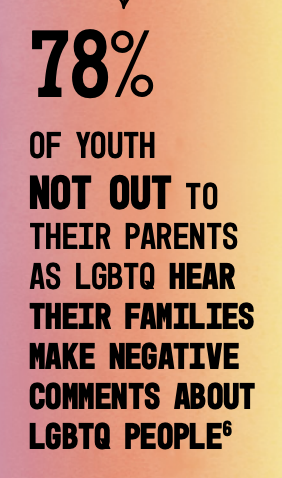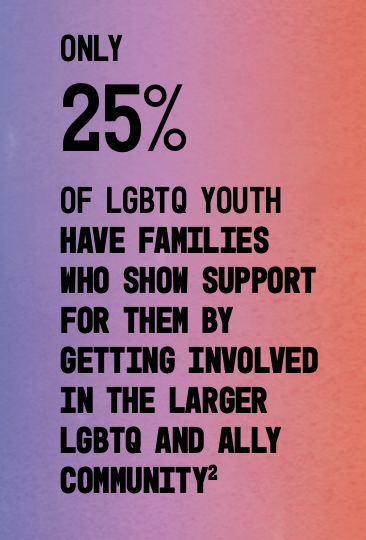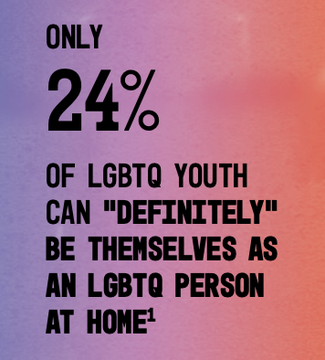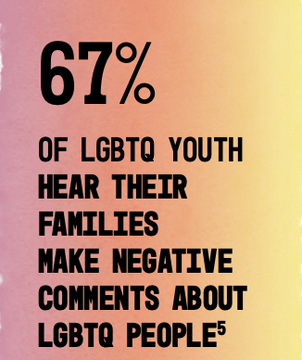For LGBTQ Youth, Home Might not be a Safe Place to Self-isolate
For Fabliha Anbar, 20, her LGBTQ identity is an important part of her social and academic life. She’s out to friends, on social media and at her progressive university, where she founded the South Asian Queer and Trans Collective. But last month, when her campus closed due to the global coronavirus pandemic, Anbar returned home — and back to the proverbial closet.
“Having to go home and act a certain way 24/7 is a means for survival,” said Anbar, who asked that the name of her university and hometown not be published. “That can be straining emotionally and extremely damaging.”
For the past six weeks, Anbar has been self-isolating in a small, two-bedroom house with her parents, whom she said she doesn’t feel safe coming out to.
Related
LGBTQ groups around the world team up for a virtual ‘Global Pride’ celebration
Anbar’s situation is not unique. Since schools across the U.S. started to close in mid-March to help stem the spread of the coronavirus, LGBTQ advocates say a number of queer youth and young adults have lost crucial support systems and have been forced to self-isolate with unsupportive family members.
“They may have had to go back in the closet if they were out at school. If they had support from a GSA or an LGBTQ club or group at school, they don’t have that anymore,” said Ellen Kahn, senior director of programs and partnerships at the Human Rights Campaign, the country’s largest LGBTQ rights group.
Kahn said she’s particularly concerned about those “who are in overtly hostile environments,” saying, “It could put them at risk of physical or emotional abuse; it could force them out to the streets.”
‘Students might feel isolated’
Danushi Fernando, the director of LGBTQ and gender resources at Vassar College in New York, said a number of students with whom she works “voiced their concerns” about returning home when the campus announced it would close last month.
“We are super aware that there are people who are not able to go back to their homes because either they’re not safe, or students aren’t out to their families,” she said.
After discussing this situation with the university administration, Vassar opened up some dorms on a case-by-case basis to students who felt unsafe leaving.
But for some of those who did leave — thinking their departure would just be for an extended spring break — living back at their parents’ house has been uncomfortable or isolating.
“There are lots of times that students might feel isolated,” she said. “There are students who have reached out like, ‘Do you know of anyone in Idaho that I could connect with?’”
Related
Few lesbian bars remain in the U.S. Will they survive COVID-19?
As for Anbar, she said she’s been hosting virtual programming and support groups over Zoom, joined by people from all over the world, for the South Asian Queer and Trans Collective. If she’s within earshot of her parents, she said she has to be careful.
“It does get kind of scary,” she said. “That’s why I make sure to be very careful about the words that I choose. I usually take advantage of the language barrier between me and my parents. I say things like ‘queer’ rather than ‘lesbian.’”
When speaking to her parents, she said she describes the South Asian Queer and Trans Collective, the organization she dedicates so much time to, as a “feminist collective,” which she said “isn’t entirely wrong.”
‘Stuck at home with abusers’
In the weeks following school closures, child abuse and neglect hotlines, like the Childhelp National Child Abuse Hotline, reported an inundation of calls and texts from young people newly confined to unsafe environments.
“A lot of these young people are stuck at home with abusers,” Daphne Young, the organization’s chief communications officer, said. “College kids are coming home from school and have to re-enter the home with perpetrators.”
Young said LGBTQ youth and adolescents have consistently been among their callers.
She also noted that the financial strain caused by the pandemic has the potential to make bad environments even worse.
“Whatever was the stressor or the discord between the family, you now have compound trauma,” Young said.
Related
Eight of 10 most-banned books challenged for LGBTQ content
Like Childhelp, The Trevor Project, a suicide prevention and crisis intervention organization for LGBTQ young people, reported a steep increase in the number of youth and young adults who have reached out to its 24/7 hotline.
The New York-based nonprofit published a white paper last month outlining the “serious implications” the COVID-19 crisis could have on the mental health of LGBTQ youth. The organization cited the physical distancing, economic strain and increased anxiety related to the pandemic as being among the most worrisome problems.
“LGBTQ young people … are already at risk of discrimination and isolation, which can impact their mental health,” Amit Paley, the organization’s CEO, said last month in an interview with MSNBC. “For a lot of LGBTQ young people, the main sources of support that they get are at their schools, at clubs, at community centers, at physical spaces that they no longer have access to. … Not being able to connect with some of those really important, positive influences in your life can be extremely challenging for LGBTQ youth right now.”
‘An opportunity’ for parents
Two thirds of LGBTQ youth hear their families make negative comments about LGBTQ people, and only 1 in 4 feel like they can be themselves at home, according to data from the Human Rights Campaign.
“If you’re that kid, whether you’re 6 or 12 or 18, that changes dramatically how you feel in your own skin, how you can thrive or not in your family,” Kahn said.

Human Rights Campaign✔@HRC · Mar 17, 2020Replying to @HRC
This decision to ask students to leave could be particularly disruptive for LGBTQ students — who may lack family support or a home to return to.
LGBTQ youth are 120% more likely to experience homelessness than their straight & cisgender peers. https://www.hrc.org/blog/new-report-on-youth-homeless-affirms-that-lgbtq-youth-disproportionately-ex …LGBTQ Youth Disproportionately Experience HomelessnessA new report on youth homelessness found that LGBTQ young adults had a higher risk of reporting homelessness compared to youth who identified as heterosexual and cisgender.hrc.org

.@HRC data shows that nearly half of all LGBTQ youth say their families make them feel bad for their sexual orientation or gender identity.
Some face mental and physical abuse at home, while others have been kicked out.




411:10 PM – Mar 17, 2020Twitter Ads info and privacy30 people are talking about this